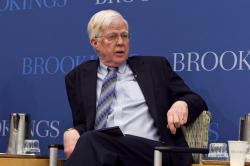Abstract
Large and sustained budget deficits have re-emerged as a central focus of the debate over U.S. economic policy. The parallels between today’s situation and the large deficits of the 1980s are striking in several dimensions. Is it possible that history will simply repeat itself, and a return to the budget discipline of the 1990s will again restore balance? This paper looks back at the efforts after 1981 to resolve the conflict over how to reduce the budget deficit. Historical data from the Congressional Budget Office are used to determine the extent which changes in the budget balance can be traced to legislative actions as opposed to unforeseen changes in the economic situation and technical revisions. The paper distinguishes among three periods: (1) a period of budget stalemate from 1981–95, (2) the emergence of budget surpluses after 1995, and (3) the reappearance of deficits in 2000–2005. The elimination of the budget deficit in the late 1990s is traced to a highly fortuitous set of economic circumstances that are unlikely to be repeated.
The second part of the paper examines the fiscal outlook over both the next decade and a longer horizon in which the aging of the population emerges as a significant budget concern. The short-term outlook is dominated by a single critical decision of whether to extend the tax reductions of 2001–2003. In the longer term, the central issue is how to control outlays of the Medicare and Medicaid programs. The paper concludes with a discussion of the U.S. experience with budget rules and various reforms to the budget process.
The Budget Crisis: Is It All Déjà Vu?
Large and sustained budget deficits have re-emerged as a central focus of the debate over U.S. economic policy. For those with memories of the acrimonious budget conflicts of the 1980s, this is discouraging news. Members of the two political parties spent over a decade blaming the other for the deficits, while essentially doing nothing. However, the optimists among us can counter with the reminder that the logjam was ultimately broken in the 1990s, and the U.S. actually enjoyed substantial budget surpluses by the end of the decade. Is it possible that history will simply repeat itself, and a return to the budget discipline of the 1990s will again restore balance?
The parallels between today’s situation and that of the 1980s are striking in several dimensions. David Stockman, Ronald Reagan’s first budget director, is alleged to have referred to a future of “$200 billion budget deficits as far as the eye can see.” In 2004, a Washington study group resurrected the Stockman quote in projecting budget deficits of $300 billion per year, again “as far as the eye can see.” It might seem as though little has changed.



